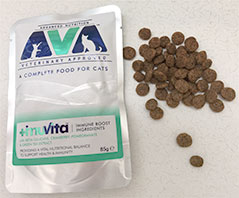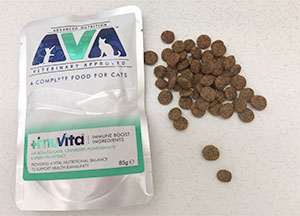

Photo courtesy of Dr. Jennifer Larsen
The Food Standards Agency, responsible for enforcing pet food labeling through authorities in England and Wales, issued a recent warning to consumers: "Pets at Home is recalling four lines of its AVA dry cat food products because there are lower levels of thiamine (vitamin B1) present than specified in the recipe. Your cat should not eat affected product batches."
Clinicians at the Royal Veterinary College in London have diagnosed an increasing number of cats with clinical thiamine deficiency, and they're advising veterinarians and pet owners to be on alert for the condition.
"Early recognition is important, and we would advise to ask your vet if you have any suspicion," the RVC said today in a statement. "All three cats treated at our hospital survived, but one patient has persistent neurological abnormalities six months after initial diagnosis that will likely be permanent as a result of the structural damage to the brain caused by thiamine deficiency."
The veterinarians suspect the cats became ill as a result of being fed a thiamine-deficient commercial dry cat food manufactured by Pets At Home, a pet-store chain in the United Kingdom that sells its own brand of kibble under the name AVA. The RVC said it alerted Pets at Home to the cases. The company subsequently recalled four AVA dry cat food diets on Feb. 24, after finding them to be thiamine-deficient.
While the RVC reports seeing three cases of illness related to the diets, others are likely. Thiamine-deficient cats have been turning up in U.K. veterinary practices at least four months, with reports of cases circulating at medical conventions, on social media and within the message boards of the Veterinary Information Network, an online community for the profession.
Thiamine is a water-soluble B1 vitamin that isn't stored in the body of dogs and cats, which makes it easy for them to become deficient if enough of the nutrient isn't obtained in their diets. Cats especially are vulnerable. Compared with dogs, they require nearly three times the amount of vitamin B1 for proper metabolism.
Felines with low thiamine levels exhibit signs of neurological impairment — cluster seizures, twitching and severe vestibular dysfunction (imbalance, vomiting and nausea). Another sign is cervical ventroflexion, which is the bending of the neck in a downward position, accompanied by neuromuscular weakness.
The array of clinical signs makes thiamine deficiency easy to miss, said Dr. Jennifer Larsen, a VIN consultant and nutritionist at the University of California, Davis, School of Veterinary Medicine.
"The problem is that the clinical syndrome of deficiency can look like a lot of things because it's neurological," she said. "I suspect a lot of these cats are getting euthanized without a lot of diagnostics. Thiamine [deficiency] isn't considered in some cases."
Larsen has been hearing about thiamine-deficient cats since January, when she met with a colleague who'd seen at least two clinical cases at the University of Bristol. All of the patients reportedly were on Pets at Home diets.
Larsen obtained samples of the wet and dry food and sent them to an Iowa laboratory for analysis, which determined that thiamine concentration in the dry food was less than 1/30 the required minimum.
Results of the wet-food analysis aren't yet in. "I would expect [the results] this week, but they haven't given me a time," she said.
Meanwhile, Pets at Home had heard from the RVC, whose veterinarians reported cases of suspected thiamine deficiency in cats who were eating the company's AVA-brand diets. After internal tests revealed the foods contained thiamine levels much lower than specified, Pets at Home recalled four lines of its dry kibble:
- AVA Veterinary Approved Grain Free Mature 7+ Cat Food Optimum Health
- AVA Veterinary Approved Grain Free Mature 7+ Cat Food Optimum Health
- AVA Veterinary Approved Grain Free Senior 12+ Cat Food Optimum Health
- AVA Veterinary Approved Grain Free Adult Cat Food Indoor/Neutered.
Pets at Home reflected on the reports of illness in a statement: "We are aware of three cats which, sadly, became seriously unwell four to six weeks after switching to one of the affected products and required veterinary care. All three cats exhibited symptoms of sudden collapse, fitting, widespread twitching and general unsteadiness, which are not the classic symptoms of thiamine deficiency."
Many veterinarians disagree with the company's assertion that twitching and collapse, seizures and cervical vestibular signs are not textbook indicators of thiamine deficiency.
Dr. Alice Wolf, a VIN consultant who's board-certified in both feline medicine and internal medicine, is one of them. Reflecting on her experience with thiamine-deficient patients, she wrote in a VIN discussion, "One of the classic hallmarks of thiamine deficiency we saw ... was that if you held the cat by its pelvis and held it head down towards the floor, it would curl up towards you rather than reaching down for the floor."
Thiamine-related troubles aren't new to the pet-food industry, but they're less common in kibble than canned food. That's largely because canned food is exposed to more heat during the cooking process and thiamine is heat-sensitive.
During the past decade, thiamine-related recalls have been issued by commercial manufacturers Nestlé Purina, Wellness and Diamond Pet Foods.
In January, the J.M. Smucker brands 9Lives, EverPet and Special Kitty fell short on thiamine, which was caught during an in-house quality review. The recall involved nearly 30 lots of the canned food products, distributed to retailers between Dec. 20 through Jan. 3.